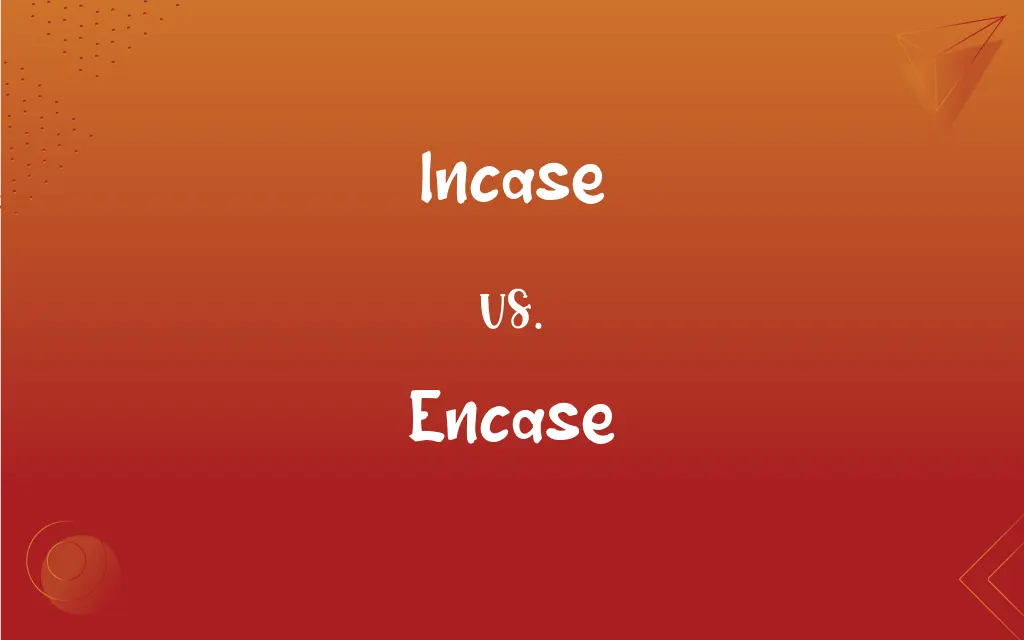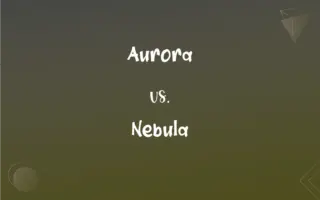Incase vs. Encase: What's the Difference?
Edited by Aimie Carlson || By Janet White || Updated on September 27, 2023
"Incase" is often a misspelling of "in case," a phrase meaning if or as a precaution, whereas "encase" means to enclose or cover completely.

Key Differences
“Incase” is generally not a standard word in English and is usually used as a common misspelling of the phrase “in case,” meaning if or as a precaution. It’s a conjunction used to represent the concept of something happening as a contingency or a precautionary measure. On the other hand, “encase” is a standard English word, a verb, used to describe the action of completely enclosing or covering something, often to protect it.
When someone uses “incase” as a misspelling of “in case,” they might be referring to scenarios involving precautions or conditions. For instance, someone might say “Bring an umbrella, in case it rains,” signaling a precautionary measure against possible rain. In contrast, “encase” typically refers to enclosing something within a case, container, or some form of cover, like “The artifact was encased in glass,” emphasizing that the artifact is completely surrounded by glass.
The usage of “incase” to mean “in case” is considered informal and non-standard, and it is recommended to use the two-word form to avoid any confusion or to be grammatically correct. “Encase” is formal and standard, utilized when something is being completely enclosed or covered, usually to offer protection or to isolate it. It has a clear and distinct meaning, making it straightforward in its usage.
In the context of grammar and sentence construction, using “in case” correctly will enhance the clarity and coherence of the statement, specifying it as a condition or a precaution. The word “encase,” when employed correctly, will also lend clarity and precision to the description, accurately conveying the act of enclosing or covering completely.
Comparison Chart
Part of Speech
Conjunction (when spelled: in case)
Verb
ADVERTISEMENT
Meaning
If or as a precaution
To enclose or cover completely
Standardness
Informal and non-standard
Standard and formal
Usage
Represents precaution or contingency
Represents the act of enclosing or covering
Example
“Take an umbrella, in case it rains.”
“The sculpture was encased in plastic.”
Incase and Encase Definitions
Incase
If it happens that.
I have the manual, in case we need instructions.
ADVERTISEMENT
Encase
To envelop or enclose securely.
The gift was encased in a colorful box.
Incase
To allow for the possibility.
We should leave early, in case of traffic.
Encase
To enclose or cover completely.
The letter was encased in a plastic sleeve.
Incase
In the event that something occurs.
In case of an emergency, call 911.
Encase
To wrap or cloak fully.
The building was encased in scaffolding.
Incase
If or as a precaution.
Bring a jacket, in case it gets cold.
Encase
To contain or hold within.
The exhibit encased rare artifacts.
Incase
As a preventative measure.
Keep a spare tire, in case of a flat.
Encase
To surround or shield.
The soldier’s body was encased in armor.
Incase
Alternative spelling of encase
Encase
To enclose in or as if in a case.
Incase
To inclose in a case; to inclose; to cover or surround with something solid.
Rich plates of gold the folding doors incase.
Encase
To enclose, as in a case.
Incase
Enclose in, or as if in, a case;
My feet were encased in mud
Encase
To inclose in or as if in a case. See Incase.
Encase
Enclose in, or as if in, a case;
My feet were encased in mud
FAQs
Is “encase” a formal word?
Yes, “encase” is a standard and formal word in English.
Can “incase” be used in formal writing?
It is recommended to use the two-word form “in case” in formal writing.
What does “encase” mean?
"Encase" means to completely enclose or cover something.
Is “in case” a conjunction?
Yes, “in case” is used as a conjunction meaning if or as a precaution.
Can “in case” and “incase” be used interchangeably?
No, it is recommended to use “in case” as “incase” is generally considered a misspelling.
Can “encase” be used as a noun?
No, “encase” is a verb. The act of encasing can be referred to with the noun “encasement.”
Is “incase” a valid word in English?
Generally, "incase" is considered a common misspelling of the phrase "in case."
Is “incase” synonymous with “encase”?
No, "incase" (or the correct form "in case") and "encase" have different meanings and are not synonymous.
What’s the noun form of “encase”?
The noun form of “encase” is “encasement.”
Can “in case” be used to represent a condition?
Yes, “in case” can be used to represent a condition or a possible scenario.
Is “encase” used to signify protection?
Often, “encase” implies protection as it means to enclose or cover completely, usually to protect or isolate.
Does “encase” imply complete coverage?
Yes, “encase” implies that something is completely enclosed or covered.
Should “in case” be used as two separate words?
Yes, the standard form is two separate words: “in case.”
Can “encase” mean to surround?
Yes, “encase” can mean to surround or envelop completely.
Is “incase” acceptable in informal communication?
While often seen, it is advisable to use the correct form “in case” even in informal communication to avoid confusion.
About Author
Written by
Janet WhiteJanet White has been an esteemed writer and blogger for Difference Wiki. Holding a Master's degree in Science and Medical Journalism from the prestigious Boston University, she has consistently demonstrated her expertise and passion for her field. When she's not immersed in her work, Janet relishes her time exercising, delving into a good book, and cherishing moments with friends and family.
Edited by
Aimie CarlsonAimie Carlson, holding a master's degree in English literature, is a fervent English language enthusiast. She lends her writing talents to Difference Wiki, a prominent website that specializes in comparisons, offering readers insightful analyses that both captivate and inform.































































